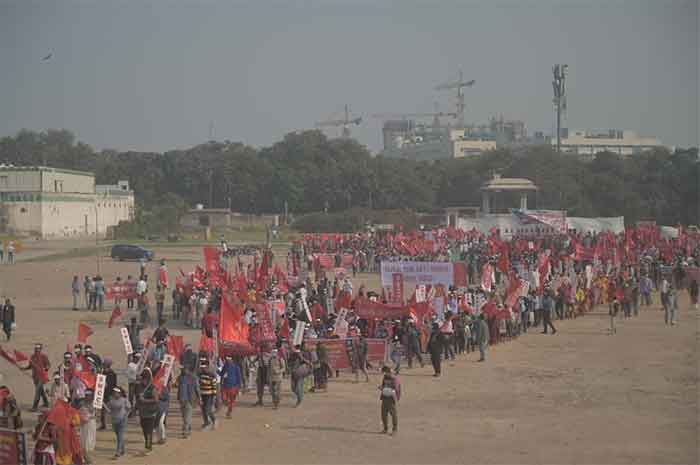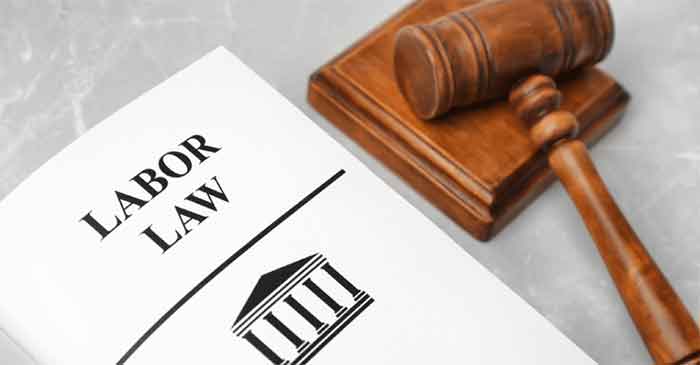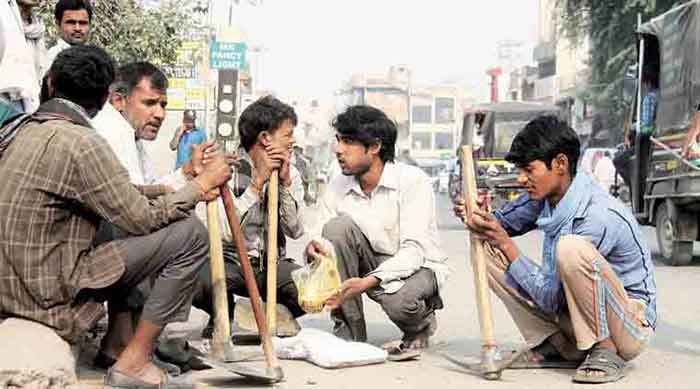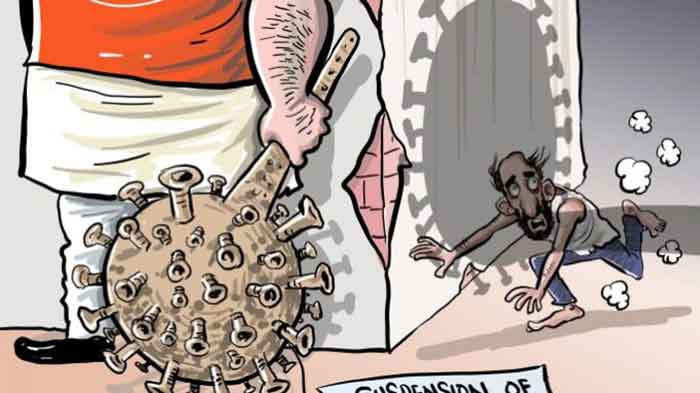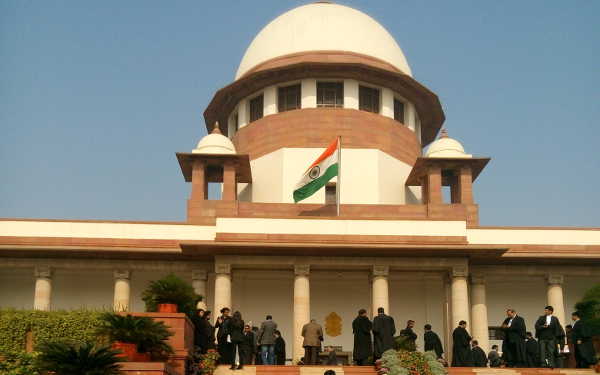
On March 24th, 2020, the Prime Minister announced a complete lockdown to contain the spread of coronavirus. The abrupt lockdown brought every economic activity, except for some essential activities, to a halt. It lead to the shutting down of factories and even small shops, and the workers working in those factories started moving towards their home. The lockdown affected the economy to such a level that it contracted to almost 24% in the first quarter of the 2021 financial year. As a response to resurrect the economy, several state governments announced an exemption from the application of labour laws. One of them is Gujarat, which exempted the application of the Factories Act, 1948. It was challenged before the Supreme Court by two trade unions.
A Supreme Court bench comprising of Justice DY Chandrachud, Kurian Joseph, and Indu Malhotra has struck down the Gujarat Government’s notifications exempting specific provisions of the Factories Act, 1948. The notification was issued under Section 5 of the act, which gives the state government power to exempt the application of all or certain provisions of the act (except section 67 relating to prohibition of employment of young children in any factory) concerning all or any class of factories. The state can exercise this power if there is a public emergency. By exercising its authority under Section 5 of the act, the Gujarat government exempted all factories registered under the factories act from applying certain provisions (Section 51, 54, 55, and 56). These provisions relate to daily hours, weekly hours, the interval for rest, and spread over. The notification extended the working hours of the workers in a week, increased the working hours’ daily limits, and fixed the overtime wages to be in proportion to the existing wages. The notification was challenged on the ground that the lockdown or the pandemic does not amount to a public emergency, fixing overtime wages in proportion to existing wages is contrary to section 59 because it requires fixing wages at twice the rate of ordinary wages. Such fixation leads to forced labour and violation of Article 21 and 23 of the constitution. Before the court, the main question was whether the pandemic and lockdown imposed as a response to the pandemic amount to public emergency or not.
Existence of Public Emergency
The court relied upon the explanation attached to Section 5 which defines public emergency. As per the explanation, “public emergency” means a grave emergency whereby India’s security or any part of the territory thereof is threatened, whether by war or external aggression or internal disturbance. This explanation was added by Act 94 of 1976 with effect from October 26th, 1976, an amendment brought during the 1975 imposition of emergency on the ground of internal disturbance. From the government’s side, it argued that the current situation amounts to a public emergency within section 5 because the pandemic has disturbed the country’s social order and the lockdown has caused extreme financial exigencies and a slowdown in economic activities leading to internal disturbance in the state. It also relied upon the Sarkaria Commission Report, which lists natural calamities and epidemic as grounds for invoking emergency. So the Gujarat Government justified this on the ground to revive the economy and protect the factories from the effects of a slowdown.
The court held that exemption under section 5 requires that a public emergency must exist. It can only exist if it satisfies a grave emergency, the security of India or any part of territory must be threatened by such existence, and the cause of threat must be war, external aggression, or internal disturbance. The court requires that these conditions must be objectively fulfilled showing a relation between the cause and effect. And after that, a proportionality test determining the validity of state action infringing the fundamental rights, as laid down in KS Puttaswamy v UOI, must be fulfilled. Interpretation of section 5 requires that the term internal disturbance must also be of a similar gravity as war and external aggression. Such a situation then must threaten the security of the state. It also recognized that the court has earlier interpreted that the state’s security and public order two different things. So the court applying its interpretation of public emergency and security of the state, concluded that the pandemic does not amount to internal disturbance. Even if it amounts to internal disturbance, then the economic slowdown caused by it does not threaten the state’s security. However, the court recognized that the pandemic and lockdown had caused economic hardship but it has not reached the threshold of exercising such emergency powers. Concerning the government’s reliance on Sarkaria Commission Report, the court clarified that the report requires such a situation of calamity or epidemic must be of nature that hinders the administration of the state and threaten the state’s security. The report also recognizes that emergency power can not be exercised on the sole ground of stringent financial exigencies. In the current pandemic the economic slowdown neither hinders with the administration of the state nor threaten the security of the state.
Object of the Notification vis a vis Object of Factories Act
The court also held that the notification object is contrary to the whole purpose of bringing the Factories Act. The government side argues that the notification’s purpose was to ensure production, adequate compensation to the workers, and protect the factories and establishments carrying out the essential activities. The purpose of the notification was to protect the factories from the pandemic and the lockdown effects. However, the court declared that the only purpose was to reduce all the factories’ overhead costs without keeping in mind the nature of manufactured products. Court reminded the government about the purpose of the factories act and the struggle that the workers and trade union has to go through in bringing such a legislation. It was of the view that the Factories’ Act has been enacted to keep a check on the unequal bargaining power between the employers and the workers. It is a result of a constant struggle between the trade unions and employers. Because of such unequal bargaining position that the Factories Act under section 59, the wages for overtime shall be twice the ordinary wages. It also said that such blanket exemption has only one intention: to force the already vulnerable class into servitude. It recognizes that the pandemic requires the state to maintain a balance between protecting the workers’ welfare on the one hand and limiting the effects caused by pandemic and lockdown. Such balance must ensure the dignity and equity of the workers.
Violation of constitution due to Notification
The court then evaluates the issue within the realms of Fundamental Rights and Directive Principles of State Policy. The court recognizes that these two aspects of our constitution present a vision for a welfare state in which the state shall ensure social, political, and economic justice. Even though DPSP is not enforceable, but it informs the government in formulating the policy. Factories act is one example in which several DPSP like Article 38, 39, 42, and 43 got its recognition. The court recognized the vision of Dr. Ambedkar to ensure economic democracy through DPSP. Economic democracy can not be achieved through a rigid straight jacket formula approach; rather, it requires a flexible approach to be fixed as per the requirements of every generation. He defended the use of the word ‘strive’ in Article 38, saying that when the situations will not be conducive or appropriate in achieving those objectives, at that point also the state should not use it as an excuse; instead, it should continue to strive to achieve those objectives. Similarily in the current situation, it is difficult for the state to achieve those objectives. Still, it should not use this circumstance for whittling down the fundamental rights guaranteed under article 21 and 23 and its objectives under DPSP.
Conclusion
The judgment is significant keeping in mind the problems that workers have gone through during this pandemic. So many have lost their lives, livelihood, shelter, etc. the court has struck down the Gujarat government’s notification only. Still, there is a long list of states which have exempted the application of labour laws. The court also recognizes that the worst-hit people during this lockdown is the workers. The state as a welfare state has a duty to balance workers’ welfare and the economy’s revival. The state can not violate or take away the basic rights guaranteed to them either under labour laws or under the constitution in the name of economic hardships.
Amit Kumar, Research Scholar, Rajiv Gandhi School of Intellectual Property law (IIT Kharagpur)
SIGN UP FOR COUNTERCURRENTS DAILY NEWSLETTER


